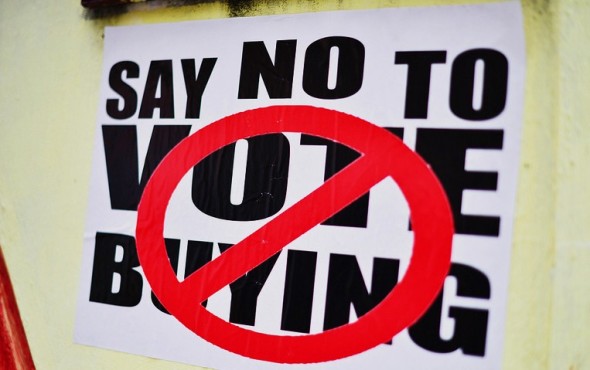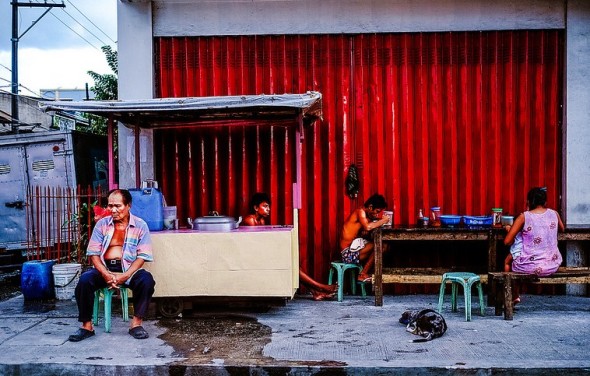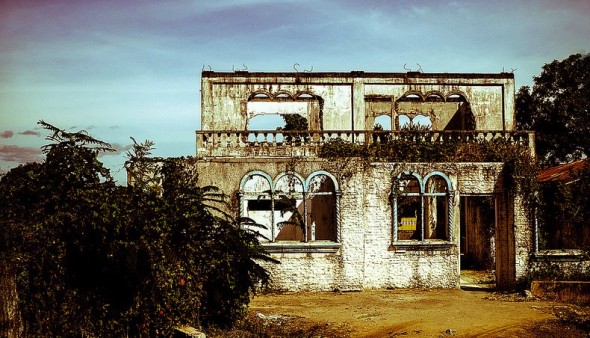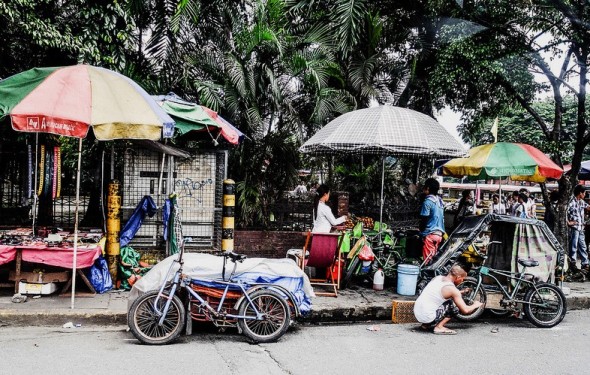Small is Beautiful: A Model of Economic Development for the Philippines and Beyond
National governments have assumed a direct hand in the economic development of countries, presumably to provide order to endeavors and undertakings that serve the well-being and improve the lives of people. This does not however mean that governments have always successfully achieved this explicitly-stated purpose.
In developed countries where most people experience a life of relative contentment in a situation of economic prosperity, a narrow chasm separates rich from poor. (In fact, “poor” evokes a different meaning in a developing, or underdeveloped, society compared to a developed society.) We might imagine an ideal scenario of economic productivity as being generally driven by an enthusiastic group of entrepreneurs and an army of satisfied proletarians who spontaneously perform collaboratively, cooperatively and coordinately with little government-policy intervention.
On the other hand, we might also imagine a breakdown of “the good life” in a comfortably prosperous setting. History reminds us of certain large-scale economic crises in emerging powers, like the United States of the early 20th century when the stock market crash of October 1929 led to the Great Depression of the 1930s. In the early 1990s, the US experienced another economic setback in the form of a recession. Another case in point was the economic crisis that hit South Asia, also in the early 1990s, and heavily damaged the emerging economies of Thailand, South Korea, Indonesia, and, in some ways, Malaysia. This is where we find government policy intervention reconsidered. The eminent economic guru, of Nobel-Prize-in-economics fame, John Kenneth Galbraith comments:
However intervention by the state may be condemned in the age of contentment, it has been relatively comprehensive when the interests of the contented are involved and relatively limited when the problems are those of the poor. In consequence, one may reasonably conclude that a recession or depression is much less likely to trigger redemptive government action than in the past. Intervention to provide employment and alleviate enhanced poverty and suffering is far less likely than hitherto. The contented electoral majority is or has been made relatively secure; it can watch the adversity elsewhere with sympathy but with no strong call for corrective measures.[1]
It is therefore important at this point to examine critically the controversies that surround the relationships between government-policy intervention and private-market activities in the economic-development process. In other words, our present concern is how to achieve the contextual conditions that properly make relevant private-market disposition on the one hand and government-policy dispensation on the other.
Economic planning
In economic planning, it is assumed that government plays an indispensable role to stabilize, normalize, and hence strengthen a country’s economy by regulating domestic economic activities as well as standardizing economic programs, with policies intended to protect the general interests of the general public engaged in both production and consumption. For the Philippine economy, this is a somewhat more complicated matter, considering that Philippine society is basically semi-feudal and semi-colonial, and the economy is a mixed economy characteristic of a developing country. This mixed economy operates in a sociopolitical setting that blurs the demarcation line between private and public sectors.
Patronage politics has “legitimized” the entire sociopolitical landscape, which is heavily controlled by the comprador big bourgeoisie and the big bureaucrat capitalists — the intertwined major economic force that has intensified economic dualism in the country. Thus Philippine politics gets under the aegis of capitalist patrons on the one hand, and Philippine economy gets protected by the bureaucratic demigods, on the other hand. In a lecture “Crisis of the Semi-Feudal Economy” delivered at the University of the Philippines in Diliman on April 18, 1986, Prof. Jose Ma. Sison clarifies that “[t]he comprador big bourgeoisie is the dominant class in the relations of production. It determines the semi-feudal character of the economy. As the chief trading and financial agent of US monopoly capitalism, it lords over the commodity system and decides the system of production and distribution.”
Sison further says that the big bureaucrat capitalists, are “big compradors and big landlords who have stood out as such by using their public offices, privileges issued by the state, state banks, and state enterprises to amass private capital and land. In Philippine history, the most outstanding example of bureaucrat capitalism would be that of the fallen Marcos regime.” In simple terms, it is not quite inaccurate to say that the Philippine socio-politico-economic formation is controlled by a conspiratorial powerhouse. Those in control of the economy are directly or indirectly the same people who call the political shots, at least in the executive and legislative branches of government.
Call for deregulation?
Given this reality, the ideal of becoming emancipated from severely burdensome government regulations and control is definitely precluded. Such an ideal is realized only in a democracy where those who control governance are sovereign people whose political empowerment cannot be assailed by an elite block. What we have in the Philippines is a pseudo-democracy, a semblance or a simulacrum of popular rule wherein the mechanics of a democratic state are operational but the dynamics are certainly expressive of a habitus of subservience to the ruling elite. State bureaucrats cannot, in any way, open an iota of possibility to relinquish the elite’s tight grip on the economy and allow the flowering of high-level competition in domestic and international commerce, much less in industrial productivity.
Whatever the case may be, government regulation will always play a necessary role even in the private markets of a liberally democratic country. Deregulation is therefore either an imagined alternative or a difficult road to travel. Taking our lessons from the US experience, deregulation in several ways derailed major economic sectors so that in the fragile economy of a developing country like the Philippines, no concrete large-scale benefit can be had once we go the way of deregulation full-speed ahead.
What about privatization?
Let us now focus our attention to fully-regulated, wholly-owned and exclusively-controlled government corporations, agencies and institutions whose services are aimed to assist the public in terms of power sourcing and distribution, water and sewage management, health and medical service provision, transportation conveyances and communication deliveries. In the Philippine context, certain areas of public facilitation have already been transferred to private ownership, operation and control.
Generally, the only expressed rationale for the privatization of state-owned public service facilities is to enhance and upgrade the efficiency and effectiveness of said services’ delivery to the public. In the Philippines, the obvious picture the whole situation leaves us with, however, is that of a grossly ineffective, inefficient, mismanaged and absolutely corrupt government system that, in the final analysis, is going nowhere but to the dogs. At the end of the day, no one is the loser except the Filipino people themselves who have been led to a dark road of confusion and uncertainty because at this very point of their so-called national life, they have no one to turn to.
On one hand, government is inefficient and unreliable. In other words, we cannot expect genuine public service from a government whose main interest is the self-gratification of its operators. This is precisely why government has failed miserably to manage its responsibilities to the public. In well-managed and highly-efficient governments of developed countries — and this, I personally experienced in some Scandinavian countries I visited — there is an explicit performance of responsible public service in major state-owned instrumentalities of facilitation, as in transportation, communication, health and medical services, water and sewage management, and power sourcing and distribution.
On the other hand, once public-service facilities have been handed over to the private sector, the people are faced with monopoly capitalism in operation. A developing country like the Philippines will inevitably be swallowed by the mouth of intensifying poverty, considering the fact that the privatization of public-service facilities may only be effected in negotiation with the well-entrenched comprador big bourgeoisie in the land. Therefore the main concern of the owners of these privatized public-service corporations is the classic capitalist objective of profit-generation through exorbitant service charges about which the people cannot complain at all.
Leveling the field through decentralization
The late eminent German-turned-British economist and social critic of the 70s, Ernst F. Schumacher, entitled his best-selling book, Small is Beautiful. It could be construed to have created an impetus for big-deal thinkers to reconsider their vantage point and place more importance on the depth and high-definition projection of small, specific concerns of human life. Even on the issues of social, political, and economic problematizations, academic as well as professional theorists have learned to value and appreciate the beauty of small things. On a more serious tone: the whole pattern of movement at this juncture is from the enormity of central concerns to the specificity of definite locales by way of a decentralized approach. Decentralization simplifies processes with absolutely no details sacrificed. It zeroes into definitive issues and concerns that are genuinely meaningful to real people who are directly affected in actual contexts. Decentralization simplifies economic planning and makes it more relevant to the recipients. In the face of decentralization, deregulation and privatization become insignificant concerns.
Gunnar Myrdal of Asian Drama and Nobel-Prize-in-economics fame explains decentralization as being “a synonym [of democratic planning] especially in reference to political self-government within units smaller than the state. The basic idea is that of organized corporation between people in the same region or locality, or in the same industry or occupation.” Myrdal beforehand establishes the notion that decentralization is actually democratic planning which, according to him, “is a term that is popular in South Asia. It embraces many ideas, but the most prominent are the following: First, ‘democratic planning’ is held to mean that planning and the policies coordinated in the plans should enlist not only the support of the masses but also their active participation in preparing and implementing planning. Secondly, it is generally held to mean that this popular participation and cooperation should emerge voluntarily so that state policies can be carried out without regimentation or coercion.”[2]
The entire decentralized situation in governance strongly encourages citizen participation in crucial decision making undertakings that will spontaneously and ultimately dissolve, in time, national governments’ serious trouble with deregulation and privatization, because a decentralized state of affairs realizes the demands of either deregulation or privatization. The celebrated futurist John Naisbitt attests to this as decentralization was actually experienced by Americans in the early 1980s:
“The failure of centralized, top-down solutions has been accompanied by a huge upsurge in grassroots political activity everywhere in the United States. Some 20 million Americans are now organized around issues of local concern. About 25 percent of the population of any neighborhood in the country say they are members of a neighborhood group. Neighborhood groups are becoming powerful and demanding greater participation in decision making.”[3]
Conclusion
Considering the geographical formation of the Philippines being an archipelago, a decentralization of governance in the political, administrative, fiscal, and market sectors is a challenging matter worthy of serious study. On a positive note, Philippine politico-economic development could truly be a matter of exciting consideration if reckoned in a decentralized landscape that should ultimately render obsolete the hegemonic power of “Manila imperialism” and in the process spawn the seeds of real economic growth in a multiplicity of centers across the archipelago from Batanes to Sulu.
There is no easy road to complete decentralization. What we are currently faced with is an awful array of cultural difficulties that hinder the way to the smooth terrain of successful decentralization.
References
1. John Kenneth Galbraith, The Culture of Contentment, (New York: Houghton Mifflin Company, 1992), p. 162.
2. Gunnar Myrdal, Asian Drama: An Inquiry into the Poverty of Nations (Abridged Edition, New York: Vintage Books, 1971), p. 169.
3. John Naisbitt, Megatrends: Ten New Directions Transforming Our Lives (New York: Warner Books, Inc., 1982, 1984), p. 121.
Editor’s Note: All photographs by Daniel Y. Go.
Related Articles






















You must be logged in to post a comment Login